Home Tags Posts tagged with "john kerry"
john kerry
Russia has handed over to the US its plans for making Syria’s chemical weapons safe, Russian media say.
Russia announced its plans for placing Syria’s stockpile under international control on Monday and Syria said it welcomed the initiative.
The proposal led US President Barack Obama to put military action against Syria on hold in favor of diplomacy.
Tense negotiations will now follow at the United Nations on the nature of any Security Council resolution.
The UN envoys of the permanent council members – the UK, US, France, China and Russia – will meet in New York later on Wednesday, diplomats say.
More than 100,000 people have died since the uprising against President Bashar al-Assad began in 2011.
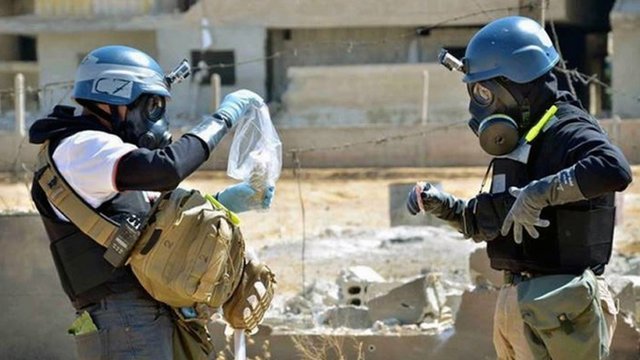
Russia has handed over to the US its plans for making Syria’s chemical weapons safe
Russian news agencies quoted one Russian source as saying: “We handed over to the Americans a plan to place chemical weapons in Syria under international control. We expect to discuss it in Geneva.”
Russian Foreign Minister Sergei Lavrov and US Secretary of State John Kerry are scheduled to meet in the Swiss city on Thursday to discuss the proposal.
One Russian source told the Itar-Tass news agency the meeting would be bilateral and not involve the UN.
The source added: “It appears that the meeting should start on Thursday and end on Friday, although it is not ruled out that it may last until Saturday.”
No further details of the proposal have been made public.
[youtube dkc5YQmyrZ4]
In the last weeks John Kerry’s eyes seemed less droopy than usual and his entire face seemed somehow wider.
Why did Secretary of State John Kerry look so different?
His personal spokesman Glen Johnson explained that John Kerry has been working non-stop with no vacation – and barely has had time to squeeze in a simple haircut.
“It’s looks to me that he has limited movement on the left side of his face,” said cosmetic dermatologist Tina Alster.
“He doesn’t have any movement in his face at all,” said plastic surgeon Barry Cohen.
It could also be one of many other possibilities. Lack of sleep – no surprise, given the last couple of months with his wife’s illness and the Syrian crisis. Or something as simple as allergies, which could cause his eyes and face to puff up. It could be a minor cosmetic procedure like Botox or another injectable, or Bell’s palsy, a common virus which affects facial nerves and can mimic a minor stroke or bad Botox. Or simply stress.
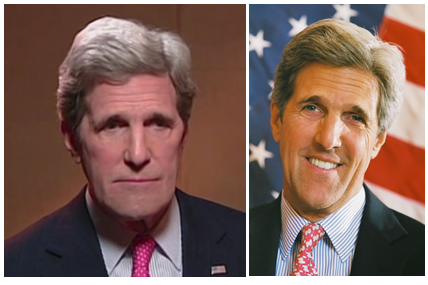
John Kerry’s eyes seemed less droopy than usual and his entire face seemed somehow wider
“Stress can always make you look not like yourself,” said Tina Alster.
“It can definitely change how your face looks.”
John Kerry, 69, is no stranger to speculation about his classic patrician face. In the 1970’s, he had an operation to correct a malocclusion – a problem with his bite that caused clicking in his jaw. His smooth, unwrinkled appearance during the 2004 presidential race caused enough of a stir that his campaign was forced to deny Botox rumors directly.
In January of 2012, John Kerry showed up at the White House celebration for the Boston Bruins sporting two black eyes.
He denied any plastic surgery. Just the result of a nasty spill while playing hockey with family and friends over the New Year’s break, he said.
But the fact that the chatter arose again this week about whether his appearance was the result of exhaustion or some cosmetic snafu annoyed those close to him.
“Not only is it a little sad that this constitutes news by anyone’s definition in Washington when we’re debating the use of force in Syria, but the answer is simple: No, end of story. That’s not a denial, that’s a fact,” Glen Johnson said.
[youtube unHgL4ddjTw]
President Barack Obama’s plans for a military strike on Syria have won backing from key US political figures.
Barack Obama said a “limited” strike was needed to degrade President Bashar al-Assad’s capabilities in response to an alleged chemical weapons attack.
Key Republican leaders John Boehner and Eric Cantor both signaled their support for military action. Congress is expected to vote next week.
The UN earlier confirmed that more than two million Syrians were now refugees.
More than 100,000 people are thought to have died since the uprising against President Bashar al-Assad began in March 2011.
President Barack Obama and Vice-President Joe Biden met House Speaker John Boehner, House Democratic Leader Nancy Pelosi and the chairmen and ranking members from the national security committees in Washington on Tuesday.
John Boehner signaled his support for Barack Obama’s call for action, saying that only the US had the capacity to stop President Bashar al-Assad. John Boehner urged his colleagues in Congress to follow suit.
Eric Cantor, the House of Representatives majority leader, said he also backed Barack Obama.
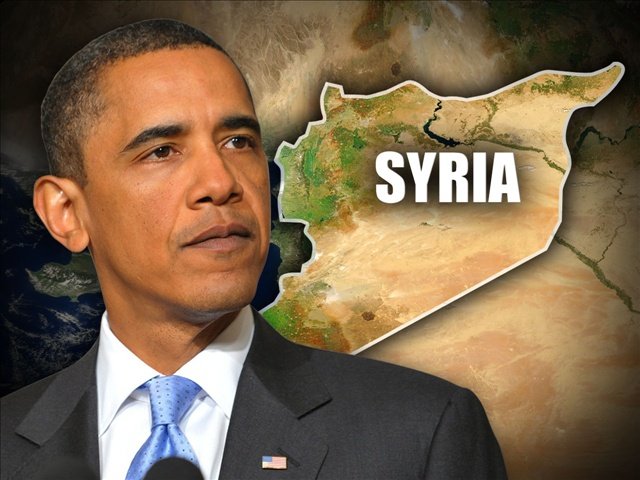
President Barack Obama’s plans for a military strike on Syria have won backing from key US political figures
The Virginia Republican said: “Assad’s Syria, a state sponsor of terrorism, is the epitome of a rogue state, and it has long posed a direct threat to American interests and to our partners.”
Nancy Pelosi said she did not believe Congress would reject a resolution calling for force.
Barack Obama said that Bashar al-Assad had to be held accountable for the chemical attack and that he was confident Congress would back him.
He said he was proposing military action that would degrade Bashar al-Assad’s capacity to use chemical weapons “now and in the future”.
“What we are envisioning is something limited. It is something proportional,” the president said.
“At the same time we have a broader strategy that will allow us to upgrade the capabilities of the opposition.”
Secretary of State John Kerry, Defence Secretary Chuck Hagel and the top US military officer, Gen Martin Dempsey, are appearing before the Senate Committee on Foreign Relations.
John Kerry told the panel that US allies such as Israel and Jordan were “one stiff breeze” away from potentially being hurt by any fresh chemical weapons attacks, and that US inaction would only embolden the Syrian president.
“This is not the time for armchair isolationism,” John Kerry said.
“This is not the time to be spectators to slaughter. Neither our country nor out conscience can afford the cost of silence.
“We have spoken up against unspeakable horror many times in the past. Now we must stand up and act.”
But John Kerry said again that there would be no American boots on the ground in Syria and that Barack Obama was “not asking America to go to war”.
Chuck Hagel said that “the word of the United States must mean something” and echoed John Kerry when adding: “A refusal to act would undermine the credibility of America’s other security commitments, including the president’s commitment to prevent Iran from acquiring a nuclear weapon.”
There will also be a classified briefing for all members of Congress.
Barack Obama will head to Sweden late on Tuesday for a G20 meeting sure to be dominated by Syria.
France has strongly backed the US plan for military action.
President Francois Hollande said on Tuesday: “When a chemical massacre takes place, when the world is informed of it, when the evidence is delivered, when the guilty parties are known, then there must be an answer.”
Francois Hollande called for Europe to unite on the issue, but said he would wait for the Congress vote.
[youtube N3Es9-e3Hww]
Secretary of State John Kerry says the US has evidence that the chemical nerve agent sarin was used in a deadly attack in Damascus last month.
John Kerry said samples from hair and blood gathered after the attack “tested positive for signatures of sarin”.
The US blames the Syrian government for the August 21 attack.
President Barack Obama has vowed punitive action but wants Congress to vote on it first.
Syria dismissed the delay and said it was ready for any strike.
UN experts have been in Syria gathering evidence to determine whether chemical weapons attacks have taken place on various occasions. They have now arrived in the Netherlands with samples for analysis.
The biggest and deadliest apparent attack took place on August 21 in east Damascus. The US says more than 1,400 people were killed.
Washington said only the Damascus government has the capacity to launch such an attack.
Syria has denied it was responsible and blames the rebels.
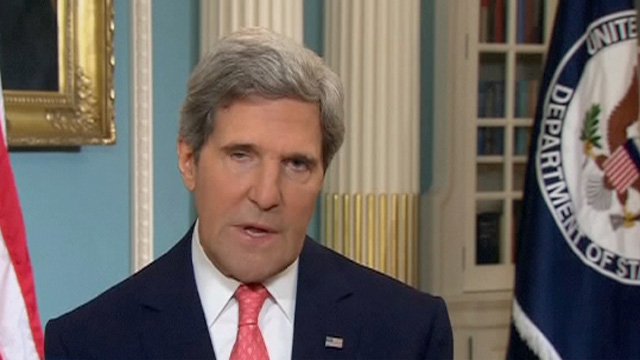
John Kerry says the US has evidence that the chemical nerve agent sarin was used in a deadly attack in Damascus last month
John Kerry implied that the US evidence was supplied by its own sources, rather than via the UN inspectors.
“In the last 24 hours, we have learned through samples that were provided to the United States that have now been tested from first responders in east Damascus and hair samples and blood samples have tested positive for signatures of Sarin,” Kerry said on NBC’s Meet The Press.
“So this case is building and this case will build.”
The US has previously said it had similar evidence of sarin use in other attacks.
John Kerry also said he was confident that Congress would give its approval for the US to launch strikes against Syria after it reconvenes on September 9.
Congressmen “will do what is right because they understand the stakes”, he said, declining to explain whether Barack Obama would press ahead even if Congress voted against.
Syrian Deputy Foreign Minister Faisal Mekdad said Barack Obama’s decision to delay the strikes pending a vote in Congress was just “a political and media manoeuvre”.
Syrian President Bashar al-Assad remained defiant on Sunday, saying: “Syria… is capable of facing up to any external aggression just as it faces up to internal aggression every day, in the form of terrorist groups and those that support them.”
The Syrian government has been fighting rebel forces since March 2011.
More than 100,000 people are estimated to have died in the conflict, and at least 1.7 million have become refugees.
Syria is known to have extensive supplies of chemical weapons.
Barack Obama has often said that using them would cross a “red line”, prompting US intervention.
On Saturday, Barack Obama said any action would be limited, ruling out a ground invasion.
Congress is due to reconvene on September 9, meaning any military operation would not happen until then.
The opposition Syrian National Coalition (SNC) said President Barack Obama’s decision to delay any strikes in Syria was a “failure in leadership” and could “embolden” the forces of President Bashar al-Assad.
Arab League foreign ministers are meeting in Cairo on Sunday, with Saudi Arabia urging them to back calls for strikes against Syria.
The UK has ruled out taking part in any attack, after PM David Cameron failed to win the support of parliament last week.
That leaves France as the only other major power that has said it could strike against Syria – though it says it will not act on its own before the vote in the US Congress.
[youtube ZZal5X6Wpnw]
Syrian government forces killed 1,429 people in a chemical weapons attack in Damascus last week, said US Secretary of State John Kerry.
John Kerry said the dead included 426 children, and described the attack as an “inconceivable horror”.
The US is pushing for intervention to stop the Syrian government from using chemical weapons.
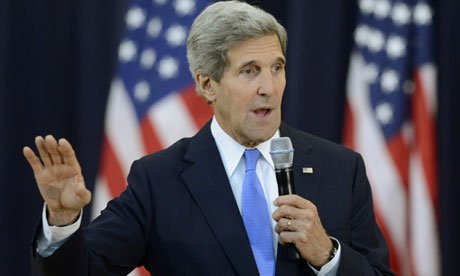
John Kerry has said Syrian government forces killed 1,429 people in a chemical weapons attack in Damascus last week
The government of President Bashar al-Assad has denied carrying out the attack and blames rebel forces.
Medical charities had previously said the attack in eastern Damascus on August 21 had killed 355.
But John Kerry said the US now had the facts, which showed 1,429 people had been killed.
He said Assad regime forces had prepared for the attack three days earlier.
“We know rockets came only from regime-controlled areas and landed only in opposition-held areas,” he said.
“All of these things we know, the American intelligence community has high confidence.”
John Kerry said the government would consult Congress and the American people over the next step.
[youtube HGtWytda1Rk]
The US forces are “ready” to launch strikes on Syria if President Barack Obama chooses to order an attack, Defense Secretary Chuck Hagel announces.
“We have moved assets in place to be able to fulfill and comply with whatever option the president wishes to take,” said Chuck Hagel.
US Secretary of State John Kerry has said there is “undeniable” proof that Syria had used chemical weapons.
The UK Parliament is to be recalled on Thursday to discuss possible responses.
Britain is considering military responses to the attack.
British PM David Cameron, who has cut short his holiday and returned to London, said MPs would vote on a “clear motion” on the crisis.
Syria’s allies, Russia and China, have stepped up their warnings against military intervention in Syria, with Moscow saying any such action would have “catastrophic consequences” for the region.
Meanwhile Syrian Foreign Minister Walid Muallem said he rejected “utterly and completely” claims that Syrian forces had used chemical weapons.
The Syrian government has blamed rebel fighters for the suspected chemical attack, which took place on August 21 near the Syrian capital Damascus, and reportedly killed more than 300 people.
On Monday, UN chemical weapons inspectors were fired on while investigating one of the five alleged attack sites around Damascus.
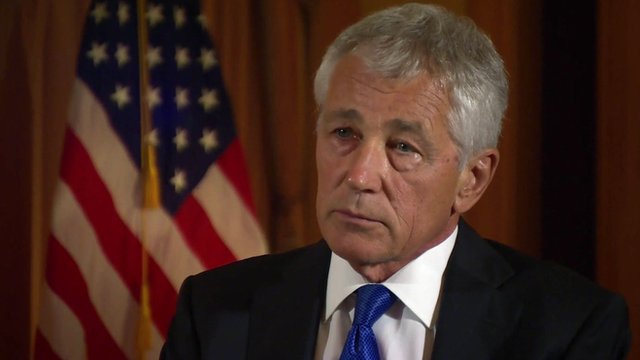
Defense Secretary Chuck Hagel announced that the US forces are “ready” to launch strikes on Syria if President Barack Obama chooses to order an attack
Chuck Hagel said the US Department of Defense had provided President Barack Obama with “all options for all contingencies”.
He said that intelligence currently being gathered by the UN inspectors would confirm that the Syrian government was responsible for the chemical attacks last week.
“I think it’s pretty clear that chemical weapons were used against people in Syria,” he said.
“I think the intelligence will conclude that it wasn’t the rebels who used it, and there’ll probably be pretty good intelligence to show is that the Syria government was responsible. But we’ll wait and determine what the facts and the intelligence bear out.”
Chuck Hagel’s remarks come a day after John Kerry accused the Syrian government of destroying evidence of its chemical weapons use in Damascus by shelling the area.
He said his administration had additional information about the attacks that it would make public in the days ahead. John Kerry described the assaults as a “moral obscenity”.
“What we saw in Syria last week should shock the conscience of the world. It defies any code of morality,” John Kerry said at a news conference on Monday.
“Make no mistake, President Obama believes there must be accountability for those who would use the world’s most heinous weapons against the world’s most vulnerable people.”
The UN Security Council is divided, with Russia and China opposing military intervention and the UK and France warning that the UN could be bypassed if there was “great humanitarian need”.
Russian President Vladimir Putin said there was no evidence that an attack had taken place or who was responsible.
The UN says more than 100,000 people have been killed since the uprising against President Assad began more than two years ago. The conflict has produced more than 1.7 million registered refugees.
Models for possible intervention
- Iraq 1991: US-led global military coalition, anchored in international law; explicit mandate from UN Security Council to evict Iraqi forces from Kuwait
- Balkans 1990s: US arms supplied to anti-Serb resistance in Croatia and Bosnia in defiance of UN-mandated embargo; later US-led air campaign against Serb paramilitaries. In 1999, US jets provided bulk of 38,000 NATO sorties against Serbia to prevent massacres in Kosovo – legally controversial with UN Security Council resolutions linked to “enforcement measures”
- Somalia 1992-93: UN Security Council authorized creation of international force with aim of facilitating humanitarian supplies as Somali state failed. Gradual US military involvement without clear objective culminated in Black Hawk Down disaster in 1993. US troops pulled out
- Libya 2011: France and UK sought UN Security Council authorization for humanitarian operation in Benghazi in 2011. Russia and China abstained but did not veto resolution. Air offensive continued until fall of Gaddafi.
[youtube ANi7ipUKnMA]
US Secretary of State John Kerry has condemned the fact that the Syrian government used chemical weapons against its own people.
John Kerry said footage of the alleged chemical weapons attack near Damascus was “real and compelling” and “undeniable”.
He said President Barack Obama was considering a response.
It comes hours after UN chemical weapons inspectors were fired on near the Syrian capital.
The team was dispatched to one of the five sites around Damascus where hundreds of people were reported to have been killed on August 21.
The Syrian government has denied launching any chemical attacks.
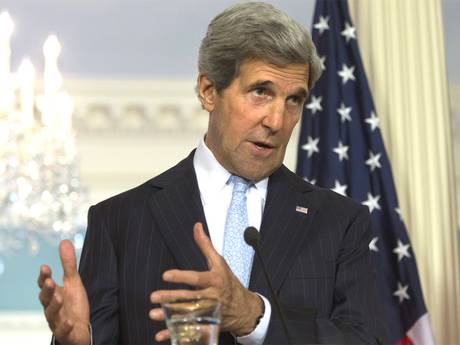
Secretary of State John Kerry has condemned the fact that the Syrian government used chemical weapons against its own people
Russia, a key Syrian ally, has strongly warned against Western military action in Syria.
“What we saw in Syria last week should shock the conscience of the world. It defies any code of morality,” John Kerry said in a briefing for journalists on Monday.
The US administration had additional information about the attack that it would make public in the days ahead, he added.
John Kerry said the delay in allowing UN inspectors to the sites of the alleged chemical weapons attack were signs the Syrian government had something to hide.
“Attacking the area, shelling and systematically destroying evidence is not the behavior of a government that has nothing to hide. The regime’s belated decision to allow access is too late… to be credible,” John Kerry said.
Russian Foreign Minister Sergei Lavrov earlier told reporters the West had not been able to come up with any proof of chemical weapons use.
Sergei Lavrov was responding to suggestions from some Western countries that military action against the Syria government could be taken without a UN mandate.
[youtube SH8di0bcPno]
Israel announces it will release a number of Palestinian prisoners as part of an agreement made with US Secretary of State John Kerry to resume peace talks.
Yuval Steinitz, minister responsible for international relations, said it would involve “heavyweight prisoners in jail for decades”.
John Kerry announced on Friday that initial talks would be held in Washington “in the next week or so”.
The Israeli minister’s remarks are the first details of the deal.
John Kerry had declined to tell reporters in Amman what the two sides had agreed to, saying that the “best way to give these negotiations a chance is to keep them private”.
The agreement came at the end of four days of frenetic shuttle diplomacy, on John Kerry’s sixth visit to the region in the past few months.
Yuval Steinitz told Israeli public radio that the deal adhered to the principles set out by Prime Minister Benjamin Netanyahu for kick-starting the talks.
The release of prisoners would take place in stages, he said.
While the number of detainees to be freed is unclear, one Palestinian official said discussions had earlier focused on the release of 350 prisoners over a period of months, including around 100 men held since before 1993, when Israel and the Palestinians signed the Oslo peace accords.
According to Israeli human rights group B’Tselem, 4,817 Palestinians are held in Israeli jails.

Israel announces it will release a number of Palestinian prisoners as part of an agreement made with US Secretary of State John Kerry to resume peace talks
For their part, the Palestinians had committed themselves to “serious negotiations” for a minimum of nine months, said Yuval Steinitz, who is a member of the prime minister’s Likud party.
But he made clear that Israel had not accepted Palestinian pre-conditions, including a halt to settlement construction in the occupied West Bank and East Jerusalem.
“There is no chance that we will agree to enter any negotiations that begin with defining territorial borders or concessions by Israel, nor a construction freeze.”
Israel and the Palestinians last held direct talks in 2010, which were halted over the issue of settlement-building.
Settlements are considered illegal under international law, although Israel disputes this.
Announcing the agreed resumption of talks, John Kerry warned that while it was significant, it was still “in the process of being formalized” and the issues that needed to be tackled were “complicated”.
One of the major sticking points for the two sides is the issue of territorial borders.
Palestinian officials say a core demand is that Israel recognizes pre-1967 ceasefire lines but right-wing members of Benjamin Netanyahu’s coalition had refused to accept talks based on the issue.
John Kerry praised the Arab League’s decision to back the plan and said Palestinian negotiator Saeb Erekat and Israeli Justice Minister Tzipi Livni would be travelling to Washington to hold the “initial talks”.
Israeli commentators point out that while Saeb Erekat has been in discussions with the Israeli PM, the Washington talks will not yet involve Benjamin Netanyahu and Palestinian President Mahmoud Abbas.
A spokesman for Mahmoud Abbas said “progress has made it possible to agree on the principles that allow for the negotiations to resume”.
The Middle East Quartet, made up of the US, Russia, the EU and UN, welcomed the “huge achievement” made by John Kerry and his team.
Tzipi Livni responded optimistically to Friday’s developments on her Facebook page, saying “four years of diplomatic stagnation” were about to end, after “months of skepticism and cynicism”.
She promised to protect Israel’s “national and security interests”, saying that she was convinced the talks were “the right thing” for Israel’s future.
Hamas, the Islamist movement that rules Gaza, has rejected the announcement of a return to talks.
“Mahmoud Abbas does not have the legitimacy to negotiate on fateful issues on behalf of the Palestinian people,” spokesman Sami Abu Zuhri said.
[youtube XJg8dGnRZsU]
Secretary of State John Kerry has said US would be “disappointing” if Russia and China had helped fugitive Edward Snowden evade US attempts to extradite him from Hong Kong.
Speaking during a visit to India, John Kerry said there would inevitably be “consequences” to such a move.
Edward Snowden flew from Hong Kong to Moscow on Sunday.
A seat was booked in his name on a flight to Cuba on Monday morning, but he is not thought to have boarded.
Edward Snowden has applied to Ecuador for political asylum, but the country’s foreign minister has implied he is still in Russia.
And speaking at a news briefing later on Monday, White House spokesman Jay Carney said: “It is our understanding that he [Edward Snowden] is still in Russia.”
He added that senior US officials were briefing President Barack Obama regularly about all the developments.
Edward Snowden, 30, is wanted by the US for revealing to the media details of a secret government surveillance programme, which he obtained while working as an IT contractor for the National Security Agency (NSA).
He is charged with theft of government property, unauthorized communication of national defense information and willful communication of classified communications intelligence.
Speaking during a visit to Delhi in India, John Kerry told reporters it would “be obviously disappointing if he was willfully allowed to board an airplane”.
“As a result there would be without any question some effect and impact on the relationship and consequences.”
Edward Snowden is believed to have spent the night in an airside hotel at Moscow’s Sheremetyevo airport. The US has revoked his passport and wants Russia to hand him over.
John Kerry urged Moscow to “live by the standards of the law because that’s in the interests of everybody”.
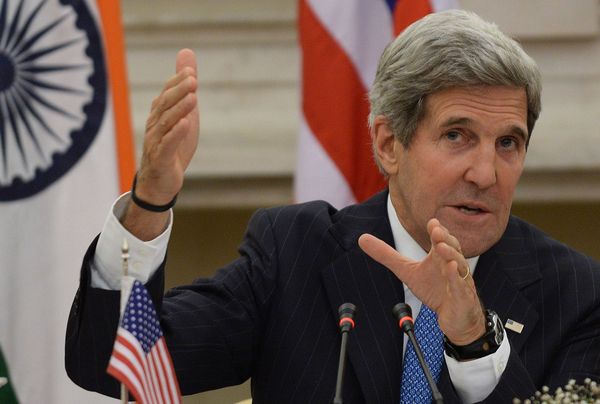
John Kerry has said US would be “disappointing” if Russia and China had helped fugitive Edward Snowden evade US attempts to extradite him from Hong Kong
“In the last two years we have transferred seven prisoners to Russia that they wanted so I think reciprocity and the enforcement of the law is pretty important,” he said.
The decision not to “provisionally arrest” Edward Snowden in Hong Kong “unquestionably has a negative impact on the US-China relationship”, he said.
He added that senior US officials were briefing President Barack Obama regularly about all the developments, and called on Russia to use all options to expel the former US spy agency contractor.
Meanwhile, Russia’s Interfax state news agency quoted an informed source as saying Moscow was considering a US extradition request, but that Edward Snowden had not officially crossed the Russian border so could not be detained.
Edward Snowden was in hiding in Hong Kong when his leaks were first published.
During a visit to Vietnam on earlier Monday, Ecuador’s Foreign Minister Ricardo Patino read out a letter Edward Snowden had sent to request asylum, in which he said he was “at risk of being persecuted by the US and its agents”.
Ricardo Patino confirmed that his country was processing an asylum request from Edward Snowden.
Quito was in contact with Moscow who could “make the decision it feels is most convenient in accordance with its laws and politics and in accordance with the international laws and norms that could be applied to this case”, he said.
When asked whether he knew of Edward Snowden’s current location he declined to answer.
“We will consider the position of the US government and we will take a decision in due course,” he said, saying Ecuador put the protection of human rights “above any other interest”.
The US and Ecuador have a joint extradition treaty, but it is not applicable to “crimes or offences of a political character”.
Edward Snowden is being supported by the whistleblowing website WikiLeaks, which said on Sunday that he was heading to Ecuador accompanied by some of its diplomats and legal advisers.
Ecuador is already giving political asylum at its London embassy to WikiLeaks founder Julian Assange – which he denies.
On Monday, Julian Assange said Edward Snowden was “healthy and safe”, and travelling to Ecuador “via a safe path through Russia and other states”.
He said Edward Snowden had left Hong Kong on a refugee document of passage issued by Ecuador, and was not carrying any NSA secrets with him.
Edward Snowden’s leaks have led to revelations that the US is systematically seizing vast amounts of phone and web data under an NSA programme known as PRISM.
He earlier said he had decided to speak out after observing “a continuing litany of lies” from senior officials to Congress.
US officials have defended the practice of gathering telephone and internet data from private users around the world.
They say PRISM cannot be used to intentionally target any Americans or anyone in the US, and that it is supervised by judges.
[youtube G-d21mjBWJQ]
[youtube ilBOqhYoKVs]
Russia and the United States have agreed to work towards holding an international conference to find a political solution to the conflict in Syria.
Foreign Minister Sergei Lavrov and Secretary of State John Kerry announced it would follow on from an Action Group for Syria meeting in Geneva last June.
John Kerry said they would try to “bring both sides to the table”.
Relations between Moscow and Washington have been strained in the last two years by differences over Syria.
John Kerry held lengthy talks with Russian President Vladimir Putin on Tuesday during his first visit to Moscow since becoming secretary of state.
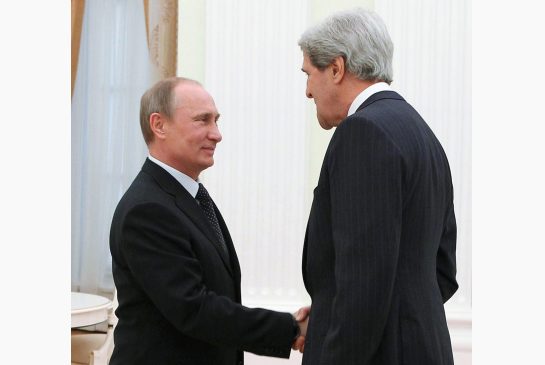
John Kerry held lengthy talks with Russian President Vladimir Putin on Tuesday during his first visit to Moscow since becoming secretary of state
He told Vladimir Putin that their two countries shared “some very significant common interests with respect to Syria”, including “stability in the region” and “not letting extremists create problems”.
“It is my hope that today we will be able to dig into that a little bit, and see if we can find common ground,” he added.
John Kerry then held further discussions with Sergei Lavrov, after which they jointly announced that they would try to organize an international conference on ending the conflict in Syria, if possible before the end of May.
It will try to convince both the Syrian government and opposition to accept a solution based on the core elements of the final communiqué issued on 30 June 2012, after the UN-backed Action Group for Syria meeting in Geneva.
The communiqué called for an immediate cessation of violence and the establishment of a transitional government that could include officials serving under Syrian President Bashar al-Assad and members of the opposition.
“We believe that the Geneva communiqué is the important track to end the bloodshed in Syria,” John Kerry told a news conference.
He added that a negotiated settlement would help avert the danger of Syria breaking up and might influence Washington’s decision on whether or not to arm rebel groups.
Sergei Lavrov reaffirmed Moscow’s belief that the departure of President Bashar al-Assad should not be a condition for peace talks, but insisted he was not trying to keep him in power.
“We are not concerned by the fate of any individual. We are concerned by the fate of the Syrian people,” Sergei Lavrov said.
[youtube SYLhCFUKO_Q]
John Kerry has called on North Korea’s leaders to “come to the table in a responsible way” to end regional tensions.
Speaking in Tokyo, the fourth and final stop on his Asian tour, US Secretary of State John Kerry warned North Korea it risked further isolation if its threats continued.
John Kerry also reaffirmed the US commitment to defend its allies, including Japan.
The countries the US official had visited were united in seeking the denuclearization of the Korean peninsula.
On Friday John Kerry visited South Korea, and on Saturday he was in China, whose leaders he has said are “very serious” in their pledge to help reduce tensions – and to help end the North Korean nuclear programme.
North Korea has recently threatened attacks against South Korea and the US, sparking alarm in the region.
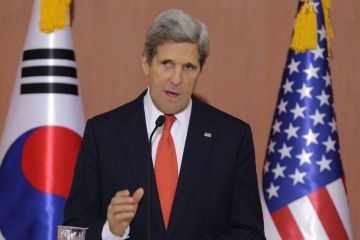
Speaking in Tokyo, the fourth and final stop on his Asian tour, US Secretary of State John Kerry warned North Korea it risked further isolation if its threats continued
Speculation has been building that the North is preparing a missile launch, following reports that it has moved at least two Musudan ballistic missiles to its east coast.
Japan is within range of these rockets and has been taking precautions, including setting up batteries of US-made Patriot anti-missile systems around the capital and sending two warships to the Sea of Japan, with orders to shoot down any missiles fired towards the Japanese islands.
At a joint news conference with Foreign Minister Fumio Kishida, John Kerry said North Korea had to understand by now “that its threats and provocations are only going to isolate it further and impoverish its people even further”.
“The US will do what is necessary to defend our allies against these provocations, but our choice is to negotiate,” he said.
“We would hope that whatever considerations and fears the North has of the US or others in the region they would come to table in responsible way and negotiate that.”
John Kerry stressed that Seoul, Beijing, Tokyo and Washington had “committed to take action together” and to “making that goal of denuclearization a reality”.
Fumio Kishida said their role was to persuade North Korea that its aggressive behavior “will not benefit them in any way whatsoever” and that the international community had to send out this strong message.
Washington and Tokyo have a security alliance dating back to the 1950s, under which Washington is bound to protect Japan if it is attacked.
On Monday, April 15, North Korea will mark the birth of national founder Kim Il-sung. Such occasions are traditionally marked with shows of military strength and it is thought this year the date could be used for a missile launch.
John Kerry has stressed that it would be a “huge mistake” for North Korea to go ahead with a launch, saying it would further isolate the country and that its people are in need of food, not missiles.
[youtube jGGiXtGYVr8]
US Secretary of State John Kerry has hailed China for being “very serious” about a pledge to help resolve tensions over North Korea’s nuclear programme.
The US and China earlier said they were committed to the “denuclearization” of the Korean peninsula.
John Kerry said the two sides would hold further meetings “to bear down very quickly” on how to achieve that goal.
North Korea has recently threatened attacks against South Korea and the US, amid a flurry of bellicose statements.
Speculation has also built that the North was preparing a missile launch, following reports that it had moved at least two Musudan ballistic missiles to its east coast.
John Kerry has said any such launch would be a “huge mistake”.
After a day of meetings in Beijing with President Xi Jinping and other top Chinese officials on Saturday, he said both governments called on North Korea “to refrain from any provocative steps and that obviously refers to any future missile shoot”.
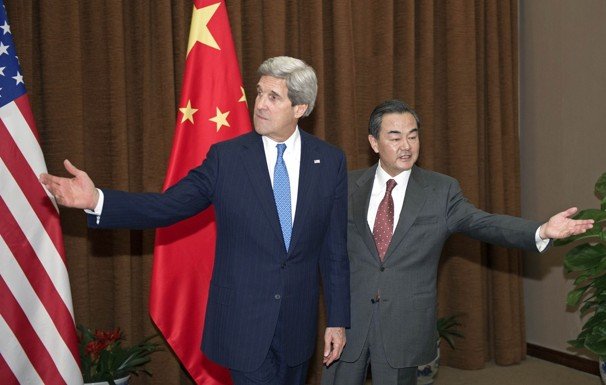
State John Kerry has hailed China for being “very serious” about a pledge to help resolve tensions over North Korea’s nuclear programme
John Kerry, who is on a four-day tour of Asia, continues to Japan on Sunday.
Following John Kerry’s meetings, China’s top diplomat Yang Jiechi said his country’s position was “clear cut”.
“China is firmly committed to upholding peace and stability and advancing the denuclearization process on the Korean peninsula,” he said, adding that the issue should be resolved “peacefully through dialogue”.
No specifics were given, though John Kerry said the two sides would hold “further discussions to bear down very quickly with great specificity on exactly how we will accomplish this goal”.
He later told reporters that the US Chairman of the Joint Chiefs of Staff, Martin Dempsey, would visit Beijing later this month accompanied by intelligence officials.
He said he wanted to ensure that the pledges made on Saturday were “not just rhetoric”, adding: “There is no question in my mind that China is very serious – very serious – about denuclearizing.”
China is North Korea’s only ally and major trading partner, but has grown increasingly frustrated with its growing belligerence.
However, persuading China to increase the pressure on North Korea will not be easy.
China is still North Korea’s lifeline, and Beijing is unlikely to cut vital supplies of food and fuel since it feels that may make the North even more desperate and unpredictable.
On Saturday John Kerry raised the prospect that if North Korea stopped its nuclear programme – “if the threat disappears” – then the US would no longer have “the same imperative… to have that kind of robust, forward-leaning posture”.
Since the UN imposed fresh sanctions on North Korea in February in response to its third nuclear test, Pyongyang has promised to restart a mothballed nuclear reactor and threatened a nuclear strike against the US mainland.
It has also shut an emergency military hotline to South Korea, and urged diplomatic staff to leave, saying it cannot guarantee their safety.
North Korea says it has also been angered by joint US-South Korean military exercises.
On Saturday, a commentary piece on Chinese state news agency Xinhua said Washington had itself “been fanning the flames” by sending military reinforcements to the region.
But during his trip, John Kerry has stressed that the US has tried to tone down its own statements, and cancelled some military exercises in an effort to defuse tension.
Though North Korea’s rhetoric has been more bellicose than usual, analysts say it fits a long-standing pattern, and may be intended to boost the popularity of Kim Jong-un, who came to power last year.
[youtube lF1kplg1Yn4]
US Secretary of State John Kerry has arrived in Beijing to urge China’s leaders to use their influence on North Korea to reduce regional tensions.
Speaking to China’s President Xi Jinping, John Kerry said the world was facing a “critical time”.
John Kerry’s four-day tour of Asia comes amid speculation that North Korea is preparing for a missile launch.
The secretary has said that as the closest ally of Pyongyang China should “put some teeth” into urging restraint.
A flurry of warlike statements from Pyongyang has prompted speculation that it might launch a missile – possibly on April 15, when the country marks the 101st birthday of the nation’s founder and former leader, Kim Il-sung.
North Korea has reportedly moved at least two Musudan ballistic missiles to its east coast, but on Saturday, South Korea’s Yonhap news agency quoted officials in Seoul as saying that no new movement of the mobile launchers had been detected for two days.
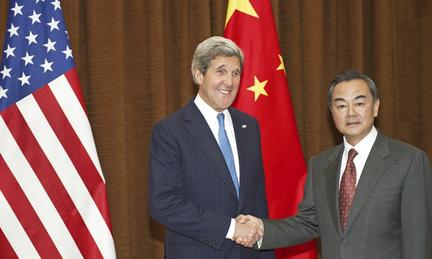
US Secretary of State John Kerry has arrived in Beijing to urge China’s leaders to use their influence on North Korea to reduce regional tensions
Since the UN imposed fresh sanctions on North Korea in February, its leadership has promised to restart a mothballed nuclear reactor, has shut an emergency military hotline to South Korea, and has urged diplomatic staff to leave, saying it cannot guarantee their safety.
North Korea says it has also been angered by joint US-South Korean military exercises.
Though North Korean rhetoric has been more bellicose than usual, analysts say it fits a long-standing pattern, and may be intended to boost the popularity of Kim Jong-un, who came to power last year.
After arriving in Beijing on Saturday and holding talks with his counterpart, Wang Yi, John Kerry told Xi Jinping the world was facing “a critical time with some very challenging issues”.
Among them were Korean tensions but also “the challenge of Iran and nuclear weapons, Syria and the Middle East, and economies around the world that are in need of a boost”, he said.
John Kerry later said he and Xi Jinping had had “constructive and forward-leaning” talks, without giving further details, Reuters reports.
On Friday, during a visit to the South Korean capital, Seoul, John Kerry said the US would protect itself and its allies, and that his talks in Beijing would aim to “lay out a path that will defuse this tension”.
He said no country had a closer relationship with Pyongyang than China.
Beijing, like Washington, wanted denuclearization on the peninsula, he said, adding: “If that’s your policy, you’ve got to put some teeth into it.”
He warned North Korea against any missile launch, saying it would be a “provocation and unwanted act” which would further isolate North Korea and its people who, he said “are desperate for food, not missile launches”.
China is North Korea’s only ally and major trading partner, but has grown increasingly frustrated with its growing belligerence.
John Kerry will be pressuring China to use its economic leverage to force its rebellious ally to tone down its threats.
But in turn, China is pushing the US to do more to make North Korea feel secure.
In Seoul, John Kerry voiced his support for the vision of a reunified Korean peninsula – so far a development neither Chinese nor Korean leadership want to see.
Russia has also expressed growing concern over North Korea and said on Friday that it had issued “an urgent appeal” to Pyongyang “to refrain from actions which could lead to further escalation of tension”.
US officials including John Kerry have been playing down a leaked report from the Defense Intelligence Agency (DIA) which warned there was “moderate” confidence Pyongyang had developed the technology to mount a nuclear warhead on a missile.
White House spokesman Jay Carney said Pyongyang had “not demonstrated the capability to deploy a nuclear-armed missile”.
[youtube zyHdLzHEgE8]
US Secretary of State John Kerry has arrived in South Korean capital Seoul for talks on the escalating tensions on the Korean peninsula.
John Kerry is discussing the crisis with President Park Geun-hye and his South Korean counterpart as well as US military commanders in the country.
US officials have said the secretary of state will use his Asian tour to urge China to use its influence to rein in Pyongyang.
John Kerry’s visit comes as a US report said North Korea could be capable of launching a nuclear-armed missile.

US Secretary of State John Kerry has arrived in Seoul for talks on the escalating tensions on the Korean peninsula
The Defense Intelligence Agency (DIA) report, a declassified section of which was disclosed by a US Congressman, said there was “moderate” confidence that Pyongyang had developed the technology to mount a nuclear warhead on a missile, though noted that its “reliability will be low”.
However, the Pentagon has since said it would be “inaccurate” to suggest North Korea has fully developed and tested such weapons.
In a statement, it said the US continued to monitor the situation, and called on North Korea to “honor its international obligations”.
John Kerry’s visit to South Korea begins his first trip to Asia since becoming secretary of state. On Saturday he will travel to Beijing and on Sunday, go on to Tokyo.
His tour comes as South Korea is on a high state of alert amid indications that North Korea is preparing for a missile test.
Pyongyang has moved two Musudan ballistic missiles to its east coast. Estimates of their range vary, but some suggest the missiles could travel 2,500 miles.
That would put US bases on Guam within range, although it is not believed that the Musudan has been tested before.
John Kerry’s trip has been planned for several weeks but the rising tensions have given it a new sense of urgency.
The US diplomacy is of limited use in dealing with North Korea itself, but that his visit is intended to reassure Washington’s allies in Seoul and Tokyo about American support.
US officials have said John Kerry will use his time in Beijing to put pressure on China – Pyongyang’s last remaining ally – to use its influence over North Korea to calm the tensions.
“Fundamentally we would want them to use some of that leverage because otherwise it is very destabilizing and it threatens the whole region,” an official told reporters on board John Kerry’s plane.
However, in the past few days North Korea’s media appear to be in more of a holiday mood, due to the approach of Monday’s celebrations marking the birth of national founder Kim Il-sung – a potential launch date for a new missile test.
[youtube Kk9vT1RdEes]
[youtube FfGkokk9hXE]
The US has urged China to use all its leverage to help rein in North Korea’s “destabilizing” actions.
US Secretary of State John Kerry is in South Korea, where he is expected to call on China to evoke “a sense of urgency” in its talks with North Korea.
Pyongyang has ratcheted up tensions in the region, threatening nuclear strikes against South Korea and the US.
A leaked US intelligence report has said North Korea may now be capable of mounting nuclear warheads on a missile.
On Thursday, a US Congressman read out what he said was an unclassified section of a Defense Intelligence Agency study. He said it assessed “with moderate confidence” that North Korea could fire a nuclear-armed missile, though with “low reliability”.
North Korea has tested both nuclear weapons and missiles, but it had been thought it had not yet developed a device small enough to be a viable and deliverable weapon.
But the Pentagon later denied the report, with spokesman George Little saying it would be “inaccurate to suggest that the North Korean regime has fully tested, developed or demonstrated the kinds of nuclear capabilities referenced in the passage”.
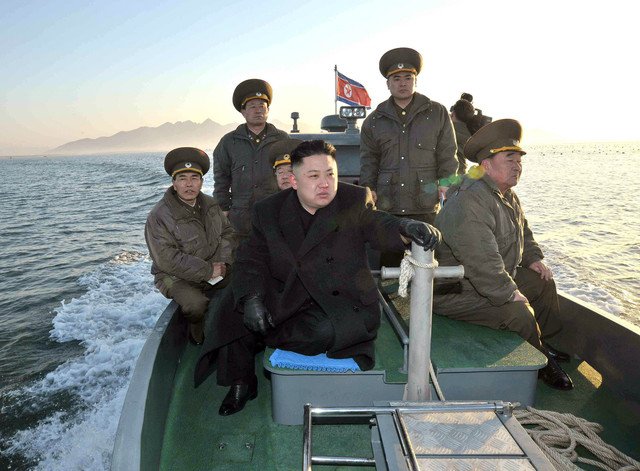
North Korea has increased its warlike rhetoric following fresh UN sanctions imposed after its third nuclear test in February
South Korea is currently on a high state of alert amid indications that North Korea is preparing for a missile test.
Pyongyang has moved two Musudan ballistic missiles to its east coast. Estimates of their range vary, but some suggest the missiles could travel 2,500 miles.
That would put US bases on Guam within range, although it is not believed that the Musudan has been tested before.
John Kerry is making his first trip to Asia since becoming secretary of state. He will spend time in Seoul and Tokyo as well as in Beijing, North Korea’s last remaining ally and its major trading partner.
A senior administration official told reporters on board John Kerry’s plane: “It is no secret that China has most leverage, most influence, with North Korea and I think fundamentally we would want them to use some of that leverage because otherwise it is very destabilizing and it threatens the whole region.”
The official added that, although Washington was not privy to conversations between China and North Korea, “we would want China to bring a sense of urgency, the need to stop this escalation, into that debate”.
“China has a huge stake in stability and the continued North Korean pursuit of a nuclear armed missile capability is the enemy of stability. That gives us and the Chinese a very powerful objective in common, namely denuclearization,” the official said.
President Barack Obama has urged Pyongyang to end its “belligerent approach… and to try to lower temperatures”.
But he warned that while he preferred to see tensions resolved through diplomatic means, “the United States will take all necessary steps to protect its people”.
China, meanwhile, has denied reports that it is deploying troops along the North Korean border.
A defense ministry official said Beijing was “paying close attention to the development of the current situation on the Korean Peninsula and has always been committed to safeguarding peace and stability in Northeast Asia,” the state Xinhua news agency reports.
North Korea has increased its warlike rhetoric following fresh UN sanctions imposed after its third nuclear test in February and joint military manoeuvres by the US and South Korea.
Pyongyang says it will restart a mothballed nuclear reactor, has shut an emergency military hotline to the South and has urged countries to withdraw diplomatic staff, saying it cannot now guarantee their safety.
However, in the past few days North Korea’s media appear to be in more of a holiday mood, due to the approach of Monday’s celebrations marking the birth of national founder Kim Il-sung – a potential launch date for a new missile test.
On Thursday, foreign ministers from the G8 group of nations condemned in the “strongest possible terms” North Korea’s nuclear weapons and ballistic missile programmes.
[youtube txbEGpUVzrQ]
Turkish Prime Minister Recep Tayyip Erdogan has been heavily criticized by the US, Israel and the UN for branding Zionism a “crime against humanity”.
Recep Tayyip Erdogan told a UN forum this week: “As with Zionism, anti-Semitism and fascism, it is inevitable that Islamophobia be considered a crime against humanity.”
Israeli PM Benjamin Netanyahu called the comments “dark and mendacious”.
New US Secretary of State John Kerry is expected to raise the issue when he meets Turkey’s leaders on Friday.
John Kerry is in Ankara for talks on the crisis in Syria.
But his visit has been overshadowed by Recep Tayyip Erdogan’s comments, comparing Zionism with fascism, anti-Semitism and Islamophobia, at a meeting of the UN Alliance of Civilizations Forum in Vienna earlier this week.
His words drew strong condemnation from Benjamin Netanyahu’s office, which called them “a dark and mendacious statement the likes of which we thought had passed from the world”.
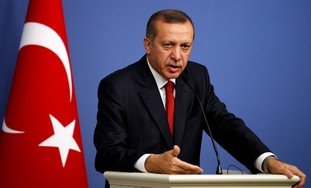
Turkish PM Recep Tayyip Erdogan has been heavily criticized by the US, Israel and the UN for branding Zionism a crime against humanity
In the US, National Security Council spokesman Tommy Vietor said “the characterization of Zionism as a crime against humanity… is offensive and wrong”.
UN Secretary General Ban Ki-moon’s office said he heard Recep Tayyip Erdogan’s speech through an interpreter, and called it “unfortunate that such hurtful and divisive comments were uttered at a meeting being held under the theme of responsible leadership”.
Relations between Israel and Turkey have deteriorated since May 2010 when nine Turkish activists aboard a flotilla of aid ships trying to break Israel’s naval blockade of Gaza were killed in clashes with Israeli troops.
[youtube XOO_R8zvL1o]
US Secretary of State John Kerry has prompted a Gallic shrug by refusing to speak French at his maiden news conference in the new position.
Asked to answer a question with a “bit of French please”, John Kerry said: “Not today. I got to refresh myself on that.”
The response surprised some in the francophone world as John Kerry attended a Swiss boarding school and is known to speak the language well.
He was speaking after meeting his Canadian counterpart in Washington.
John Kerry’s knowledge of French prompted scorn from the right-wing US press during his unsuccessful bid for the presidency in 2004, due to the souring of US-French ties over the war in Iraq.
Since then, he has played down his language proficiency, bolstered during childhood summers spent at his mother’s family estate in Brittany.
Foreign Minister John Baird was the first foreign dignitary to be welcomed to the state department by John Kerry since he took office last week.
Speaking alongside John Baird at his maiden press conference as the top US diplomat, John Kerry urged Iran to address concerns about its nuclear programme.
The 69-year-old former Massachusetts senator said the US was committed to preventing Iran from securing a nuclear weapon and would continue its policy of both pressure and engagement to try to bring this about.
He said the international community would respond, if – as he put it – Iran was ready to talk substance at the negotiations to take place in Kazakhstan later this month. Iran insists its nuclear programme is solely for civilian purposes.

US Secretary of State John Kerry has prompted a Gallic shrug by refusing to speak French at his maiden news conference in the new position
The 2004 Democratic presidential candidate was greeted by a cheering crowd of employees on Monday in the large black-marble lobby of the state department.
John Kerry succeeds Hillary Clinton who, in her four years as the top US diplomat, visited 112 countries and notched up nearly a million air miles.
In a speech to staff, John Kerry joked that he had “big heels to fill”.
The new state department head has spent much of his first week getting in touch with foreign leaders.
Last weekend, he spoke to Israeli Prime Minister Benjamin Netanyahu and Palestinian Authority President Mahmoud Abbas.
John Kerry also contacted the foreign ministers of Japan, South Korea, Turkey and Mexico, as well as John Baird.
John Kerry
- Born in 1943 in Aurora, Colorado
- Became first Vietnam veteran to testify to Congress on the war
- Elected to Senate in 1984 and chaired foreign relations committee since 2009
- Failed presidential run in 2004 against incumbent George W. Bush
- John Kerry is the wealthiest man in the Senate, worth more than $184 million
- Married to ketchup heiress Teresa Heinz
Hillary Clinton held a farewell address to state department staff on her last day as America’s top diplomat.
Hillary Clinton, 65, leaves the post after four years, visits to 112 countries and nearly a million air miles.
She will be replaced by John Kerry, a Massachusetts senator, who was sworn in at a private ceremony on Friday.
The former first lady is now discussed as a possible candidate for the 2016 presidential election.
Hillary Clinton said leading the agency as the 67th US Secretary of State had been a “unique and singular, exciting and challenging” experience.
She acknowledged the attack on the US embassy in Turkey – a sobering reminder of the everyday global threats that will face her successor.
“I am very proud of the work we have done together,” she told her staff.
“Of course, we live in very complex and dangerous times, as we saw again just today at our embassy in Ankara, where we were attacked.”
But she said she was “more optimistic” now than when she took up her post in 2009.
“I am so grateful that we’ve had a chance to contribute in each of our ways to making our country and our world stronger, safer, fairer and better,” she told staff.

Hillary Clinton held a farewell address to state department staff on her last day as America’s top diplomat
Earlier in the day, Hillary Clinton officially tendered her resignation to President Barack Obama, her former bitter rival in the 2008 race for the Democratic presidential nomination.
In her letter, she said she was more convinced than ever of America’s strength as a global leader and its potential to be a force for good.
Hillary Clinton has been coy about a possible White House run in four years’ time. She has said she has no specific plans for the future, but that she “absolutely” still plans to make a difference on issues she cares about.
“I am going to be secretary of state until the very last minute when I walk out the door,” she told the Associated Press on Thursday.
“And then I am going to take the weekend off and then I may start thinking about all the various offers and requests and ideas that have come my way.”
Hillary Clinton’s time in office will also be remembered for the attack last September on a consulate in Benghazi, Libya, that killed a US ambassador and three other Americans. She has apologized for that security failure.
[youtube zfEQHVWEeLs]
President Barack Obama is to nominate John Kerry to be his next secretary of state, US media report.
John Kerry would replace Hillary Clinton at the head of the state department, the media quoted senior administration officials as saying.
John Kerry ran as Democratic presidential candidate in 2004 and is chairman of the Senate Foreign Relations Committee.
His nomination comes after the US ambassador to the UN, Susan Rice, withdrew from consideration last week.

President Barack Obama is to nominate John Kerry to be his next secretary of state
Republicans had fiercely criticized her role in the aftermath of the deadly attack on the US consulate in Benghazi, Libya, in September.
They had threatened to block her nomination despite the president’s strong defence of her actions.
John Kerry, 69, would be Barack Obama’s first cabinet nomination since he won a second term last month.
Analysts say John Kerry is unlikely to face opposition from Republicans.
 Prev123Page 3 of 3
Prev123Page 3 of 3



















